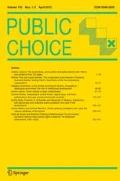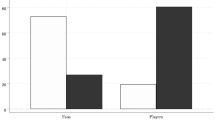Abstract
The Peltzman Effect is a well known and controversial theory in the literature. Studies have struggled to find a dataset that can accurately test for the presence of the effect. We have created a unique dataset and use a natural experiment from the sport of stock car racing to test the theory. Using race-level data from NASCAR events, we find strong evidence that a major safety regulation has led to more on-track accidents and an increased risk to both spectators and pit crew members.
Similar content being viewed by others
References
Fielden, G. (1994). Forty plus four 1990–1993: First supplement to the forty years of stock car racing series. Surfside Beach: Galfield Press.
Graham, J. D., & Garber, S. (1984). Evaluating the effects of automobile safety regulation. Journal of Policy Analysis and Management, 3, 206–224.
Hoffer, G., & Millner, E. (1992). Are drivers’ behavioral changes negating the efficacy of mandated safety regulations? Regulation, 15, 15–17.
Hoffer, G., & Peterson, S.P. (1994). The impact of airbag adoption on relative personal injury and absolute collision insurance claims. Journal of Consumer Research: An Interdisciplinary Quarterly, 20(4), 657–662.
Lund, A., & Hazelbaker, K. (1993). Reviewing the evidence on air bags. Regulation, 16, 3–5.
McGee, R. (2007). NASCAR nation’s big story: The cost of racing. Retrieved March 20, 2007, from http://msn.foxsports.com.
Nesbit, T. M., & Sobel, R. S. (2007). Automobile safety regulation and the incentive to drive recklessly: Evidence from NASCAR. Southern Economic Journal, 74, 71–84.
Nextel Cup Standing and Statistics. Retrieved November 2, 2007, from http://racing-reference.info/.
O’Roark, J. B., & Wood, W. C. (2004). Safety at the racetrack: Results of restrictor plates in superspeedway competition. Southern Economic Journal, 71, 118–129.
Peltzman, S. (1975). The effects of automobile safety regulation. Journal of Political Economy, 83, 677–726.
Potter, J. M. (2007). Estimating the offsetting effects of driver behavior in response to safety regulation: The case of formula one racing. Dissertation, Kansas State University.
Risa, A. E. (1994). Adverse incentives from improved technology: Traffic safety regulation in Norway. Southern Economic Journal, 60, 844–857.
Risa, A. E. (1992). Public regulation of private accident risk: The moral hazard of technological improvements. Journal of Regulatory Economics, 335–346.
Robertson, L. S. (1977). A critical analysis of Peltzman’s ‘The effects of automobile safety regulation’. Journal of Economic Issues, 11, 587–600.
The Official NASCAR Preview and Press Guide (1996–2004 Editions). Charlotte: UMI.
Author information
Authors and Affiliations
Corresponding author
Additional information
The views expressed herein are those of the author and do not necessarily reflect the views of the Federal Reserve Bank of Kansas City or the Federal Reserve System.
Rights and permissions
About this article
Cite this article
Pope, A.T., Tollison, R.D. “Rubbin’ is racin''': evidence of the Peltzman effect from NASCAR. Public Choice 142, 507–513 (2010). https://doi.org/10.1007/s11127-009-9548-2
Received:
Accepted:
Published:
Issue Date:
DOI: https://doi.org/10.1007/s11127-009-9548-2




